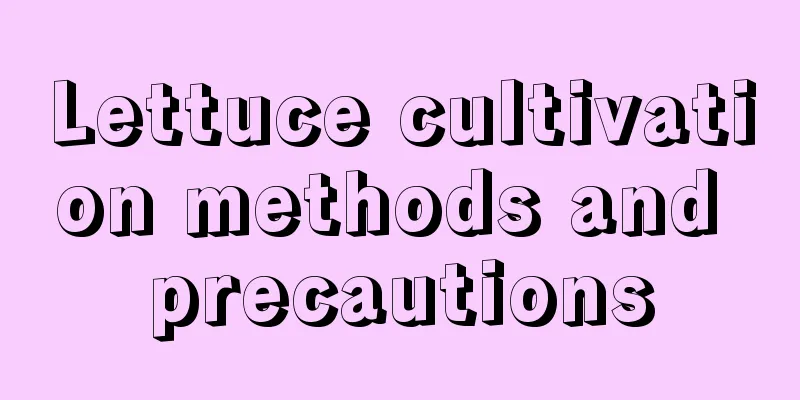Lettuce cultivation methods and precautions

1. Maintenance methods1. Substrate: Lettuce will grow better if planted in slightly acidic soil. You should choose well-drained and loose soil. Its roots are shallow and its absorption capacity is relatively weak, so sandy loam can be used for planting. 2. Light: Lettuce is a plant that likes cool weather and cannot tolerate high temperatures. However, it also needs sunlight and good ventilation. Long-term exposure to sunlight will cause it to grow too tall. 3. Temperature: The temperature during the breeding period can be maintained at around 15℃-20℃, and it needs to be cooled down when the temperature is too high. 4. Water: In the early stage of lettuce growth, watering should be neither dry nor wet, but in the later stage, sufficient water is required. Lack of water will cause the stems to age and taste bitter. Just wait until the soil is dry and then water them appropriately. 2. Breeding techniques1. Sowing: Lettuce can be planted in spring. Place its seeds on the soil and cover it with a film. 2. Overwintering: Lettuce cannot tolerate low temperatures. If you grow it in winter, it is best to grow it in a greenhouse with fertilizer. 3. Problem diagnosis and treatment1. Viral disease: When lettuce is infected, it will have mosaic leaves. It needs to be treated with 1000 times diluted 50% carbendazim, once every week, and a total of about 4 sprays are required. 2. Aphids: Use 20% virus A per pound of water and spray it in 500 pounds. Do not use it under direct sunlight. It should be sprayed after it cools down. The medicine can be used at any time on cloudy days. IV. Other issues1. Can it be planted in the ground: Yes, it can be planted in the ground. It has a wide adaptability and a wide planting range. Choose fertile land that can be drained and irrigated, and the temperature should be controlled at the most suitable temperature for lettuce growth. 2. Is it poisonous? Lettuce is not poisonous. It is a kind of vegetable, so it is not harmful to humans. |
<<: The breeding methods and precautions of Wengzhu
>>: Cultivation methods and precautions of black persimmon
Recommend
The growth environment and characteristics of Tianshan Snow Lotus
The growth environment conditions and requirement...
Can pig bones be used as fertilizer?
Pig bones as fertilizer Pig bones can be used as ...
When and how to change the soil of the fortune tree
Time to change the soil of the fortune tree The m...
How seeds germinate and grow
1. Swelling When seeds are germinating and growin...
When is the best time to prune yew?
Pruning of yew Pruning yew can reduce nutrient co...
How to prune anthurium after flowering
Pruning Anthurium after flowering It is best to c...
Is Tigerthorn suitable for a large or small pot?
Should I use a large or small pot for Euphorbia m...
How often should the planet be watered?
Planet Watering Tips The planet likes an environm...
How to care for the newly bought Kalanchoe
1. Don’t rush to change the pot Don't rush to...
How to sow shell flower
Sowing characteristics of shell flower Everyone k...
Cinnamon benefits, how to eat cinnamon
1. Efficacy 1. Help lose weight: In daily life, m...
How to propagate bear's paw by bud cuttings, leaf cuttings, and sowing
Bear paw reproduction method Common propagation m...
The difference between dewweed and dew grass
The main difference The difference in appearance ...
Maintenance of Kalanchoe in summer
1. Provide shade in time When caring for the plan...
How to propagate cactus
1. Cutting propagation To propagate cacti by cutt...









